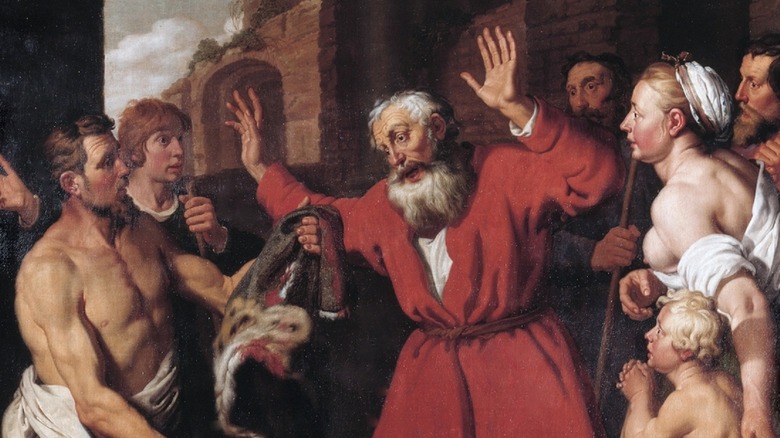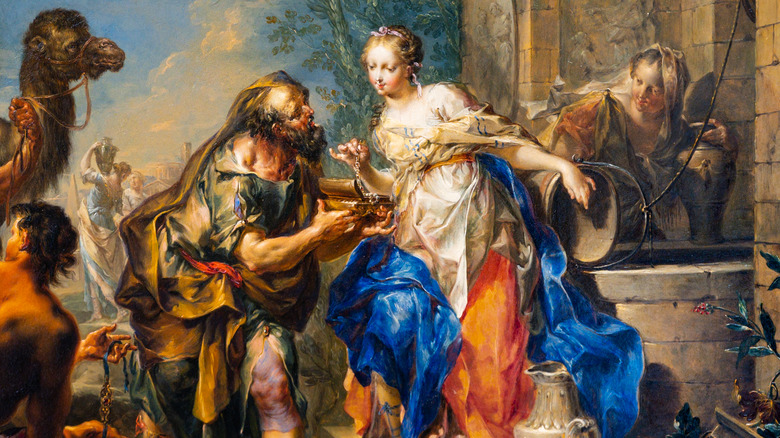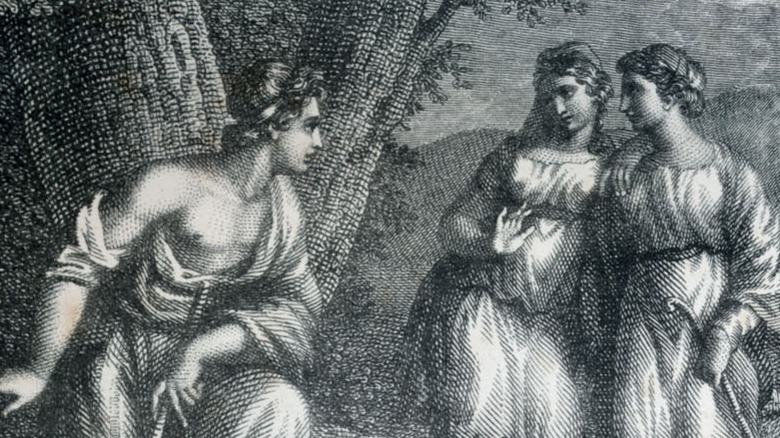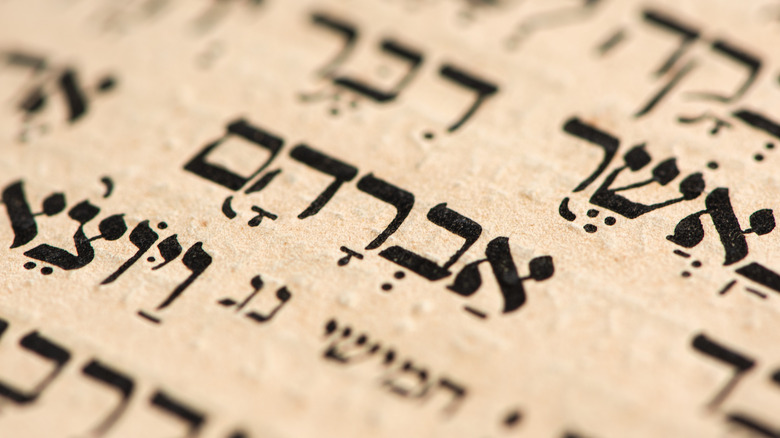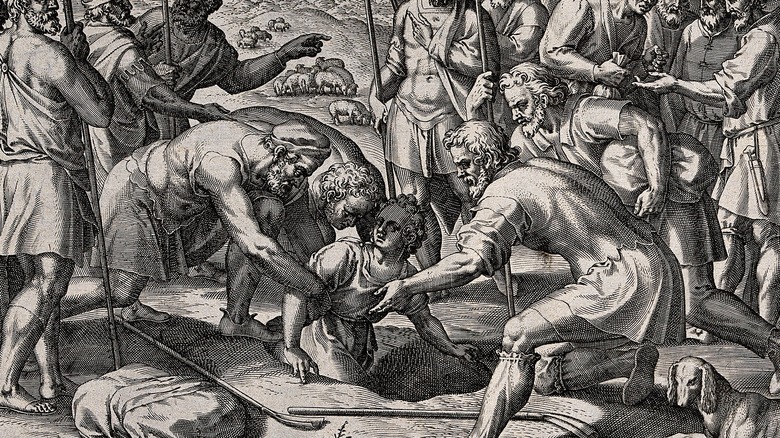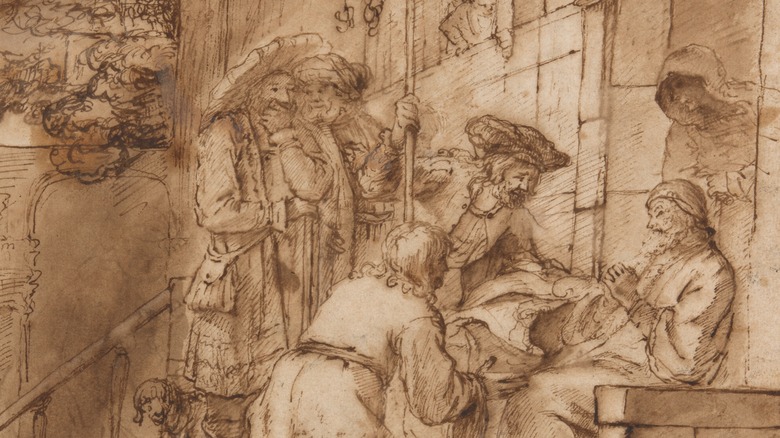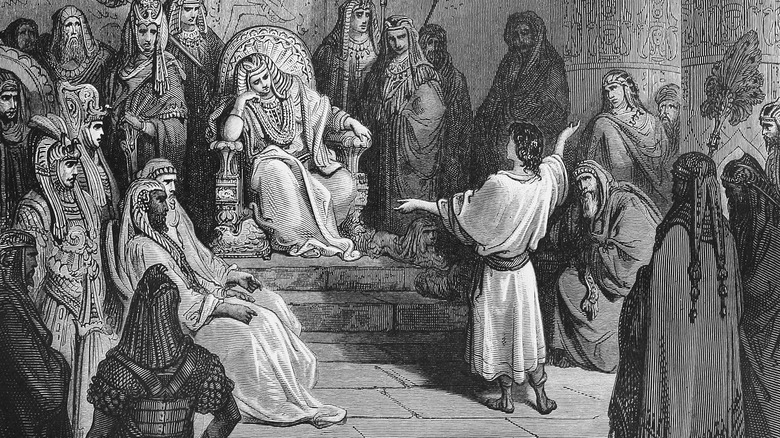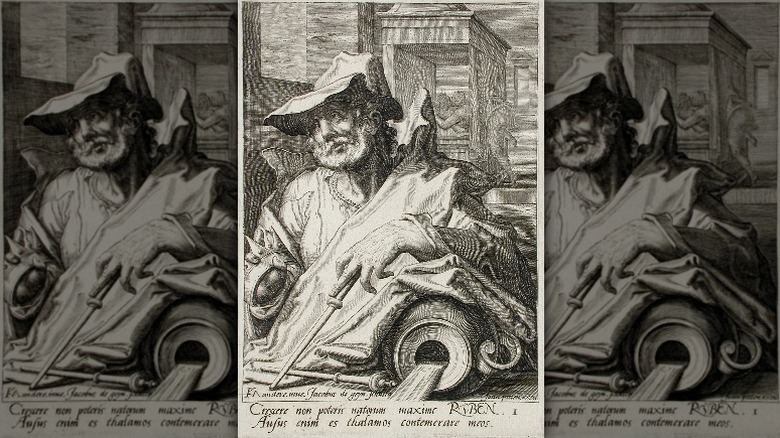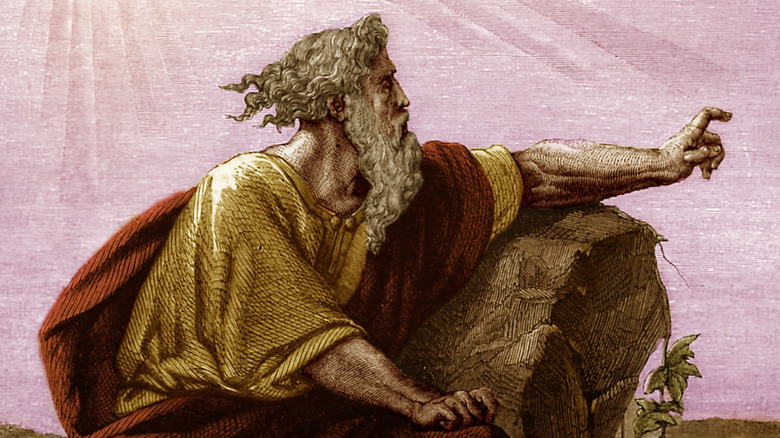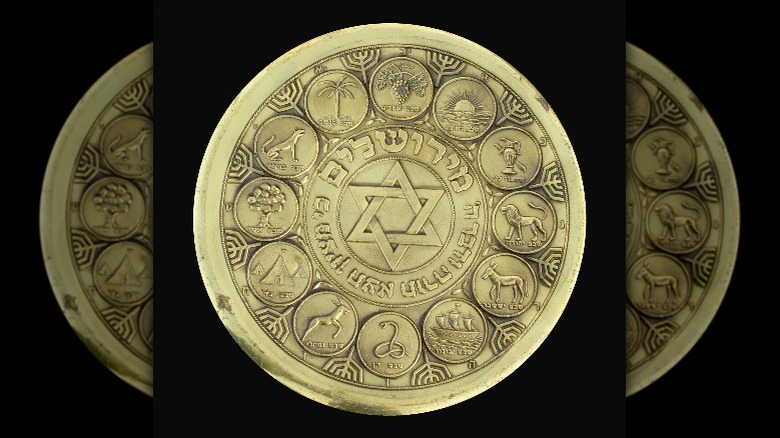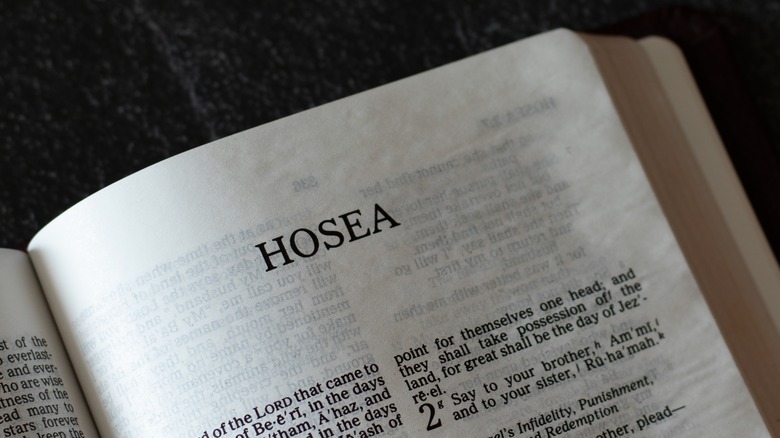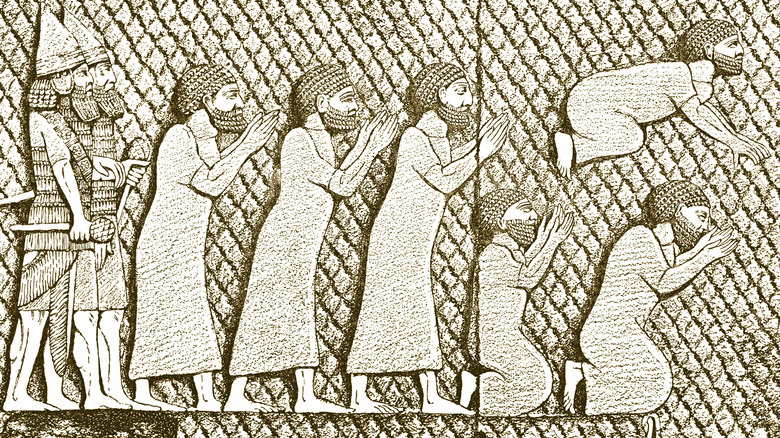The Untold Truth Of Reuben From The Bible
Biblical tradition is filled with characters ranging from Methuselah to Naaman who flit in and out of the narrative like a raven from Noah's ark. Some of these B-list characters are more important than others. One great example is Reuben.
According to the Jewish Virtual Library, Reuben first appears in the Book of Genesis as the oldest son of the Hebrew patriarch Jacob. A search of the King James Bible shows that in the entire Old Testament, the name Reuben appears only 70 times. Most of the time, it is in reference to the later legendary Tribe of Israel that was named after him. In the narrative of the Genesis story, where Reuben appears the most as a person, his name can only be found 13 times. Despite the paucity of references, the untold truth about Reuben is that these appearances are consequential.
Reuben is especially central to the story of Joseph, and he is also important spiritually since, as "The Cambridge Companion to the Talmud and Rabbinic Literature" points out, he becomes one of the first penitents. After all, much of the Old Testament is about Yahweh (the Hebrew name for God) smiting unrepentant evildoers such as the inhabitants of Sodom and Gomorrah. This article will take a deep dive into all Reuben lore and look not just at canonical literature like the Old Testament, but also apocryphal sources that provide more insight about this largely unknown but highly important figure in Judeo-Christian tradition.
Reuben's story begins with a love triangle
Reuben's story begins with his father, Jacob. The tradition passed down in the King James Bible relates how Jacob had first tricked his older brother Esau into selling his birthright to him and then later tricked his father Isaac into giving him the blessing reserved for Esau. Esau vowed to kill Jacob, and at the behest of his mother, Jacob fled. National Geographic explains how Jacob escaped to his uncle Laban who lived in Harran.
In Harran, Jacob had a Michael Corleone meets Apollonia thunderbolt moment when he encountered Laban's daughter Rachel. He fell completely in love with his cousin and asked Laban for Rachel's hand in marriage. Laban agreed, but only after Jacob worked for him by tending his flocks for seven years. The love‐smitten Jacob agreed and worked for his uncle. After seven years, he then got married. However, Jacob found out in his wedding bed that the veiled woman he married was actually Leah, Rachel's older sister. Apparently, in Harran there was a custom where the older daughter had to be married first. Laban then demanded another seven years of herding for Rachel, so Jacob picked up his shepherd's crook again. Thus, Reuben — who was Leah's son — was thrust at birth into a love triangle between two sisters and their cousin.
Reuben was born because of hate
It is unsurprising, given the circumstances, that Jacob did not care for Leah. In fact, the King James Bible uses the term "hated." Yahweh works in maybe not so mysterious ways sometimes. He decided to help Leah out by making her fertile and Rachel infertile. As a result, Leah gave birth to our main character, Reuben.
In patriarchal Hebrew society, giving birth to a son was a cultural imperative for a wife. Because she had done so, Leah thought her troubles were over. In fact, according to the Jewish Encyclopedia, Reuben's name means "Behold the splendid son!" Meanwhile, "Essential Figures in the Bible" says that the name's origins might be explained by a Genesis verse: "The Lord has seen my affliction [ra'ah b'onyi]. ... Now my husband will love me."
In the Genesis account of the story, Yahweh continued to aid Leah at the expense of Rachel. After Reuben, Leah went on to add three more boys to Jacob's family: Simeon, Levi, and Judah, while Rachel had none. Rachel was getting frustrated and grew jealous of Leah. So she gave Jacob her maidservant, Bilhah, as a concubine, with the intent to produce children. Rachel was being a mother vicariously through Bilhah — when Bilhah gave birth to two of Jacob's sons, it was Rachel who named them. By this point, Leah was no longer bearing children, so she did the same thing and gave Jacob her handmaiden Zilpah, who bore two more sons. During this escalating maternal war, Reuben makes his first true entrance into the text.
Reuben brought his mom mandrakes
In Genesis, it is related how Reuben, as a child, went into the wheat fields during harvest and collected mandrakes (pictured, left) for his mother Leah. The mandrake, according to "Exploring Genesis," is a common type of plant with red and white flowers. More importantly, it was reputedly an aphrodisiac. When Rachel saw Reuben with the mandrakes, she wanted some, thinking it might help her bear children. She made a deal with Leah: Rachel would get some mandrakes, and in exchange, Leah would get to spend a couple of nights with Jacob. (Leah, by this time, was no longer sleeping with Jacob.) The plan backfired. Leah gave birth to two more sons plus a daughter.
Rachel finally gave birth to two sons, Joseph and later Benjamin. This finally rounded out Jacob's dysfunctional family to include Jacob, two wives, two concubines, twelve sons, and one daughter (though there were probably more of these).
There are speculations about the mandrake story. One is offered by "Construction of Gender and Identity in Genesis," which analyzes scholar Seth Kunin's theory that Reuben's mandrake offering is implied incest, since the plant was considered an aphrodisiac. However, because of the cultural taboos that would have been broken by such an act, Kunin's argument is purely speculative. In any case, according to "Essential Figures in the Bible," the mandrake would become the symbol of the Tribe of Reuben.
Reuben was smitten with venereal disease for sinning
Reuben's next appearance in Genesis is a brief but incredibly critical moment. Reuben had sex with Bilhah, who was Jacob's concubine. Jacob must have had great affection for Bilhah, but no consequences are mentioned in the Old Testament except that Jacob "heard it."
More insight as to what happened is provided in the apocryphal "Book of Jubilees." In this telling of the story, Reuben saw Bilhah bathing privately. He lusted for her, snuck into her tent while she was sleeping, and raped her. This she reported to Jacob, telling him that she was "defiled" and "unclean." Jacob never had sex with Bilhah again. When considering the usual kind of biblical justice, it is surprising that Reuben wasn't just killed outright for his transgression. Instead, at least according to another apocryphal work, "The Testaments of the Twelve Patriarchs," Reuben says that justice started with venereal disease, which he describes as "a sore plague in my loins for seven months." Apparently, Jacob prayed for Reuben during this time, but this would not prevent a lifetime of penance to come.
Another spin on this episode is offered by "Essential Figures in the Bible," which suggests Reuben's act might have been an attempt to assert his birthright, since it was custom at that time for an heir to sometimes "take possession of his father's wife."
Reuben was a repentant sinner
Reuben became associated with the sin of lust, and repentance for it. This is described at length in the "The Testaments of the Twelve Patriarchs." In this account, Reuben spoke to his sons before he died and stated, "I repented for seven years in the set purpose of my soul before the Lord. Wine and strong drink I drank not, and flesh entered not into my mouth, and I tasted not pleasant food, mourning over my sin, for it was great."
The rest of the text goes on to riff about temptations of the flesh and how to avoid them. It also spends a good deal of time decrying women, saying they are "overcome by the spirit of fornication more than men" and other such sentiments. In any event, the book "Pomegranates and Golden Bells," in its analysis of Reuben, concludes that the text of the canonical Bible implies that Reuben was forgiven. He must have expressed remorse to achieve that forgiveness. One subtle signal is that Genesis, right after the story of Reuben's intercourse with Bilhah is recounted, notes that Jacob had 12 sons. This seems to imply that he wasn't disowned as a son (since it otherwise would have said 11 sons), but he certainly was demoted in status.
Reuben was the least nasty brother to Joseph
It is within the context of Reuben as a repentant sinner that we can look at Genesis' Joseph story. Joseph was Rachel's son and the most beloved to Jacob, which was signified by a coat of many colors his father had given to him as a gift. Joseph also had the nasty habit of going around to his older brothers and describing dreams in which representations of his kindred in the forms of stars or sheaves of wheat bowed to him. This was rather untactful of Joseph, and his brothers plotted to kill him, dump the corpse into a pit, and tell their father that an animal had eaten him.
Reuben is the only brother who stepped in to prevent the murder. He told them to toss Joseph in the pit, but not murder him. This they did. Reuben planned to retrieve him later and return him to Jacob. However, it was not to be.
Reuben ended up being in a conspiracy he wanted no part of
Joseph's brothers went to feast without Reuben present. According to Genesis, they decided they would sell their young, uppity brother into slavery. When Reuben returned to the pit, he found Joseph missing and found out what had happened. Although he was so upset that he "rent his clothes," he still became part of the conspiracy to cover up the crime. They dipped Joseph's clothes in goat's blood and presented it to their father, saying a beast had eaten the boy.
So the question is, where was Reuben when the other brothers were feasting? The likely answer is explained in "Pomegranates and Golden Bells," which links Reuben's absence at the meal to the fasting penance he had undertaken for his sin with Bilhah. Another scenario is given by the Jewish Encyclopedia, which says he may have left to serve his father. Either way, without Reuben to control his brothers, Joseph was doomed. Thus, the likely truth is that Joseph ended up getting sold into slavery because of Reuben's sin, which led to the penance that made him absent at that critical juncture in time.
Reuben would have let his father kill his sons
The story of Joseph is one of the most well‐known in Genesis. To summarize, Joseph was enslaved to the Egyptians, but when his gift of reading dreams helped him predict a famine, he became a powerful official of the pharaoh. Meanwhile, Jacob and his family were suffering, so he sent all his sons excluding Benjamin to Egypt to get grain. When they arrived, they did not recognize the now-powerful Joseph, who knew who they were.
Joseph took one of the brothers, Simeon, hostage and demanded that the others return to Egypt with Benjamin. At this, Reuben realized that they were being punished for selling Joseph into slavery and chastised his brothers. Reuben's contrition went even further. According to the Jewish Encyclopedia, when the brothers returned and told Jacob what happened, Jacob refused to let Benjamin go to Egypt. But Reuben, in ill‐conceived inspiration, told his father that if they didn't come back safely with Benjamin, Jacob could kill Reuben's two sons. This would of course mean Jacob killing his own grandchildren. Jacob didn't accept the offer, but after initial refusals, he did allow Benjamin to go to Egypt with his brothers when the famine grew worse. This eventually led to Joseph revealing himself and established how the Israelites ended up in Egypt.
Reuben was cursed by his father
The story of Reuben doesn't quite end there. When Jacob was about to die, he brought all his sons together to give them a final blessing. On the surface, at least, what he said to Reuben may be construed as a curse. The text in Genesis reads: "Reuben, thou art my firstborn, my might, and the beginning of my strength, the excellency of dignity, and the excellency of power: Unstable as water, thou shalt not excel; because thou wentest up to thy father's bed; then defiledst thou it: he went up to my couch."
"The Bible as It Was" points out that even on his deathbed, Jacob still remembered what Reuben did to Bilhah. Although it is treated sparsely in the canonical text, the implication is that Reuben's birthright to a "double portion" had been revoked. Instead, the birthright was passed on to Joseph's sons, Ephraim and Manasseh. What is more, according to the Jewish Encyclopedia, Reuben was disqualified from priesthood (which passed to Levi) or rulership (which passed to Judah). So despite a lifetime of penance, the truth is that Reuben could never be forgiven for his sin. Tradition holds he died at 125 years of age. His body would later be interred in Palestine after the Exodus.
Reuben was forgiven by Moses ... maybe
Even though Reuben was stripped of his status and birthright, the truth is that he is an icon of forgiveness. This idea perhaps makes its most noteworthy appearance in the Old Testament's Book of Deuteronomy, when Moses prays about Reuben and states, "Let Reuben live, and not die; and let not his men be few." But how could Moses be praying about Reuben so many years after his death? "Pomegranates and Golden Bells" suggests that it may be an older prayer that would logically have been said by Jacob. Perhaps this refers to the venereal disease Reuben suffered, as highlighted in "The Testaments of the Twelve Patriarchs."
Meanwhile, the apocryphal Book of Jubilees says, "And let them not say: to Reuben was granted life and forgiveness after he had lain with his father's concubine, and to her also though she had a husband, and her husband Jacob, his father, was still alive." So Reuben's status is ultimately nebulous. He was allowed to live, but he wasn't necessarily allowed to flourish.
Reuben's tribe came from four sons
Hebrew tradition holds that the sons of Jacob were the founders of the Twelve Tribes of Israel. The Tribe of Reuben, called the Reubenites, was founded by Reuben's four sons, whom the Jewish Encyclopedia tells us were Hanoch, Pallu, Carmi, and Hezron. Take population growth for what it's worth, but at the time of the Exodus, the Reubenites were said to number over 46,000 adult men.
In any case, the Jewish Virtual Library describes the connections between stories about Reuben the biblical character and the tribe that bore his name. At one point, the Reubenites were the leading tribe of Israel, but they lost that status. Some believe the tribe's troubles could be traced back to Reuben's sin, downfall, penance, and demotion. It could be that the legend linking the two events was fashioned after the fact to explain the changing political fortunes of the tribe at the time when the Israelites were forging their own histories.
The only notable descendent of Reuben is Hosea
Throughout the Old Testament, Reuben had no significant biblical figures descended from his line or his tribe except one. According to the Jewish Virtual Library, this was the minor prophet Hosea. The central message of Hosea's story seems to be very fitting to Reuben.
According to the Jewish Encyclopedia, Hosea is commanded by Yahweh to marry an adulterous woman, who represented how the people of Israel had left God and must be punished. Then he is later commanded to remarry his adulterous wife to show that God will continue to love his people despite sins and wickedness. Thus, Hosea amplifies the continued theme of sin, penance, punishment, and forgiveness. Per the Jewish Virtual Library, the Book of Hosea's text emphasizes how the Israelites' relationship with God is like a marriage covenant. "Prophets of the Lord" notes that the Book of Hosea has much more sexual imagery than other prophet texts — something that somehow seems to fit well with the sin of Reuben.
The Tribe of Reuben was absorbed by another tribe
The loss of Reuben's status and how it was reflected in the tribe named after him is called out in Chronicles, which states that it was because of Reuben's sexual assault on Bilhah that the Reubenites were set apart. The Jewish Virtual Library notes that as a tribe, the Reubenites were sheep and cattle herders who did not live in Israel proper but east of the Jordan, where they often came into conflict with other tribes. It's notable that, during the period when the tribes were governed by leaders known as "judges," there were no judges from the Tribe of Reuben (per the Jewish Encyclopedia).
The Reubenites were eventually subsumed by the greater tribe of Gad. They were able to retain a separate identity for a while, but this did not last. The Reubenites, and thus the story of Reuben, came to an end in 733 to 732 B.C., when they came under the thumb of the Assyrian Empire and were exiled (per the Jewish Virtual Library).
